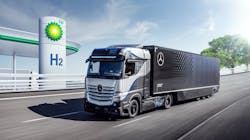BP and Daimler Truck to Develop Hydrogen Trucks and Supporting Infrastructure
Oil and gas firm BP has signed a memorandum of understanding with commercial vehicle manufacturer Daimler Truck AG to develop hydrogen infrastructure and hydrogen-powered fuel-cell trucks in the UK, facilitating the decarbonization of freight transport. BP will evaluate the feasibility of designing, building, operating and supplying 25 hydrogen refueling stations by 2030. Green hydrogen, which is generated using renewable sources, will be supplied to these refueling stations. Daimler intends to begin delivering the trucks from in 2025.
Karin Rådström, CEO of Mercedes-Benz Trucks and Member of the Board of Management at Daimler Truck, said, “We are consistently pursuing our vision of CO2-neutral transport. Especially for CO2-neutral long-haul road transportation, the hydrogen-powered fuel-cell drive will become indispensable in the future. Together with BP, we want to jointly develop and scale the required hydrogen infrastructure by putting our hydrogen-powered fuel-cell trucks into our customers’ hands and thus supporting the decarbonization of the UK freight network. At the same time, political support plays an important role in promoting the creation of an infrastructure for green hydrogen and making an economically viable use of fuel-cell trucks possible for our customers.”
“Hydrogen is critical to decarbonizing hard-to-abate sectors—and for heavy and long-distance freight it is sometimes the only answer,” said Emma Delaney, BP’s executive vice president for customer and products. “Working with a leading manufacturer like Daimler Truck AG we can accelerate the deployment of both vehicles and infrastructure and pioneer the use of hydrogen to fuel the next generation of [UK] freight. From producing and supplying hydrogen through to building and operating the fueling stations, BP is perfectly positioned to transform transport and ultimately build a better energy future.”
BP’s plans for the UK include the development of a hydrogen production facility in Teesside, with a production capacity of 1 GW of blue hydrogen, which is generated using natural gas. The facility will also be equipped with carbon capture and storage technology.
Meanwhile, Daimler Truck intends to offer only CO2-neutral vehicles in Europe, North America and Japan by 2039. To achieve this goal, the firm is focused on CO2-neutral technologies, like battery power and hydrogen-based fuel-cells, with preference for liquid hydrogen.
BP and Daimler Truck’s efforts align with the UK government’s target of developing a 5-GW hydrogen production capacity by 2030.
About the Author
EnergyTech Staff
Rod Walton is head of content for EnergyTech.com. He has spent 17 years covering the energy industry as a newspaper and trade journalist.
Walton formerly was energy writer and business editor at the Tulsa World. Later, he spent six years covering the electricity power sector for Pennwell and Clarion Events. He joined Endeavor and EnergyTech in November 2021.
He can be reached at [email protected].
EnergyTech is focused on the mission critical and large-scale energy users and their sustainability and resiliency goals. These include the commercial and industrial sectors, as well as the military, universities, data centers and microgrids.
Many large-scale energy users such as Fortune 500 companies, and mission-critical users such as military bases, universities, healthcare facilities, public safety and data centers, shifting their energy priorities to reach net-zero carbon goals within the coming decades. These include plans for renewable energy power purchase agreements, but also on-site resiliency projects such as microgrids, combined heat and power, rooftop solar, energy storage, digitalization and building efficiency upgrades.
